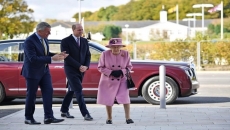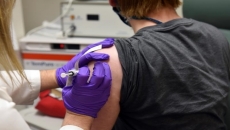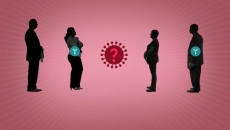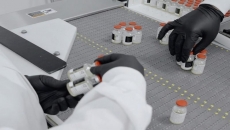The head of the World Health Organization’s Europe office said the exponential surge of coronavirus cases across the continent has warranted the restrictive measures being taken, calling them “absolutely necessary” to stop the pandemic.
In a meda briefing on Thursday, Dr. Hans Kluge warned that even more drastic steps might be needed in such “unprecedented times.”
He called for countries and their citizens to be “uncompromising” in their attempts to control the virus and said most of the COVID-19 spread is happening in homes, indoor spaces and in communities not complying with protection measures.
“These measures are meant to keep us all ahead of the curve and to flatten its course,” Kluge said, while wearing a dark-green mask. “It is therefore up to us to accept them while they are still relatively easy to follow instead of following the path of severity.”
He said that the coronavirus is now the fifth leading cause of death in Europe and noted the region recently surpassed the threshold of reporting 8,000 deaths per day. Although Kluge said the higher figures could partly be attributed to higher testing rates, especially among younger people, he said that Europe had recorded its last new million cases in just 10 days.
Kluge cited epidemiological models that suggested if 95% of people wear masks and other social distancing measures are applied, Europe could avoid about 281,000 deaths by February. But he warned that relaxing measures could lead to a five-fold increase in deaths by January.
Kluge declined to criticize countries for exiting lockdown too quickly without adhering to the recommendations set by WHO and said a balance needed to be struck since earlier restrictions were “unsustainable.” In Britain, for example, the government has faced repeated criticism for encouraging people to go back to work, to eat out in restaurants and to travel — while failing to implement a comprehensive contact tracing system to track new clusters.
Katie Smallwood, WHO Europe's senior emergency officer, urged countries to act quickly.
“We don't have the luxury of time,” she said, acknowledging that surveillance and response systems in some countries are imperfect. “Even as the swell of cases occurs, we need to continue to try to test every case, contact, identify and trace all contacts,” she said.
The European Commission also called for countries to step up their coronavirus efforts before any eventual COVID-19 vaccine, as it released its latest vaccination strategy Thursday. It said member countries should start preparations now to immunize its citizens against COVID-19 in the future, by taking measures like ensuring health workers are trained and addressing any logistical requirements necessary for shots that may need to be transported at extremely low temperatures.
The European Union's executive commission has struck numerous bilateral deals with pharmaceuticals to secure more than 1 billion doses of experimental coronavirus shots and said all countries should have access to them at the same time. But officials gave no details on how that might be possible, since not every member state has vaccine manufacturing capacity and will have to rely on others to ship them doses. In past emergencies, countries have stopped vaccines from being exported until their national needs have been satisfied.






